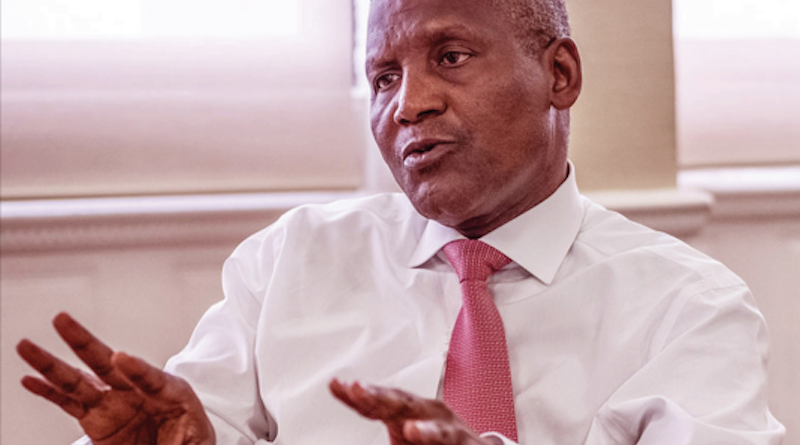Time to end the costly fuel subsidy, Dangote Tells FG
The President and Chief Executive of Dangote Group, Aliko Dangote, has urged the Federal Government to end fuel subsidies completely.
Speaking in a 26-minute interview with Bloomberg Television in New York on Monday, the time is right to end subsidies, which have gulped trillions of naira from the country’s coffers.
According to him, the removal would assist in determining the country’s actual consumption.
His advice follows the recent commencement of petrol lifting from the Dangote refinery and the price increment to ₦950 per litre in Lagos State and its environs, and above ₦1000 in the north.
He stated that fuel production from his refinery will help ease pressures on the naira, and also confirmed ownership of two oil blocks in the upstream sector with an expected production date of next month.
He said, “Subsidy is a very sensitive issue. When you subsidize something, people tend to inflate the price, leading to the government paying unwarranted amounts. The time has come to eliminate subsidies.
“But this refinery will resolve a lot of issues out there, you know, it will show the real consumption of Nigeria, because, you know, nobody can tell you. Some estimates suggest that Nigeria consumes 60 million litres of gasoline per day.
“Some say, it’s less. However, if you consider our current production, everything is countable. Everything can be accounted for, especially most trucks and ships loading from us.
We are going to put a tracker on them to be sure they are going to take the oil within Nigeria, and that, I think, can help the government save quite a lot of money. I think it is the right time, you know, to remove the subsidy.”
Dangote also spoke on whether or not the federal government retaining fuel subsidies would pan out well for his refinery, “Well, you see, we have a choice of either one. We produce and export, and when we produce, we sell locally. However, our company is a large, privately owned enterprise. And yes, it’s true, we have to make a profit. We build something worth $20bn so definitely we have to make money.
“The removal of subsidies is entirely dependent on the government, not on us. We are unable to alter the price, but I believe the government must make a trade-off. My conclusion is that this subsidy must go.”
Nigeria had imported all petrol consumed in the country.
President Bola Tinubu removed the subsidy when he took office in May 2023.
The move has since jerked up the inflation rate to about 34 percent in 2024, before declining to about 32.15 percent in August. Food inflation remains high at about 40 percent.
Since last year’s relaxation of the rules that pegged the currency at an artificially high level, the naira has lost about 70% of its value against the dollar.
“Petroleum products consume about 40 percent of our foreign exchange,” Dangote said, adding that fuel from his refinery, which started supplying gasoline on Sept. 15 to the state-owned oil company for domestic sale, “can actually stabilise the naira.”
The billionaire also revealed the details of the pricing disagreement that occurred with the Nigerian National Petroleum Company Limited.
He said the national oil company bought its current stock from the refinery at a lower price than imported fuel, but gave a uniform price for all products.
“There wasn’t really a disagreement, per se. On the 15th of September, NNPC purchased about 800,000 metric tonnes of imported gasoline from us at the international price. Therefore, the gasoline they purchased from us actually costs less than what they are currently importing.
“And so, when they announced our price, I don’t know whether he was authorized.” It wasn’t really the true price. What they’ve announced is most likely what it cost them, including profit and other expenses.
“And then they import the other one.” However, people are unaware of how much they spend on imports, despite the fact that their imports are approximately 15 percent more expensive than ours.
“They should sell at a set price, or if they wish to eliminate the subsidy, they can declare their intention to do so. This is acceptable; everyone you know will make the necessary adjustments.”
Dangote said that discussions are still ongoing and a detailed agreement will be finalized this week on the planned crude oil sales, which are expected to begin in October.
“We will sell the crude in naira once we have purchased it in naira.” We are currently collaborating with the committee to determine the appropriate exchange rate pricing. It is going to be normal pricing; if crude is $80, we will pay that price at an agreed exchange rate.
Next, we plan to expand our sales into the domestic market. What that will do is remove 40 percent of the pressure on the naira. So, you see, petroleum products consume about 40 percent of foreign exchange, so you know, and then, you know, it’s like you have 40 percent of demand taken out so that you actually stabilise the naira, and even if they subsidise, they would know what they are paying for
The agreement aims to provide the government with the desired outcome. It’s also a win-win situation for all, and it would benefit the country.
“Currently, discussions are still ongoing to determine the details of the agreement. They’re working on something that I think would be a win-win for us and the NNPCL.
“The agreement is very robust. Well, first of all, we would have energy security, where they would give us crude. For example, in October, they’re going to give us 12 million barrels, which is on average, about 390,000 barrels a day, which will sell both gasoline, diesel, and aviation fuel.”




